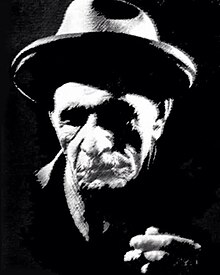Âşık Veysel
Âşık Veysel Şatıroğlu , mostly just Aşık Veysel with real name Veysel Şatıroğlu (born October 25, 1894 in the village of Sivrialan in Şarkışla ; † March 21, 1973 ibid) was one of the most famous and influential Turkish baglama players, singers and poets from the Anatolian region .
Life
Aşik was born into an Alevi family. It is said that his mother Gülizar gave birth to him alone when she was on the way to the pasture to milk sheep and cut the umbilical cord by hand. Then she went back to her village with the newborn baby. His father was the farmer Ahmet Şatıroğlu. Veysel lost his left eyesight at the age of seven during a smallpox epidemic that was rampant in Sivas at the time . His two older sisters had died of the disease before he was born. He later lost his right eye in an accident caused by his father with an ox stinger. To comfort his son, his father bought the ten-year-old a long-necked lute (bağlama).
He was later married off by his parents to a distant relative named Esma , who gave birth to a son and daughter. His son died shortly after he was born, and his mother and father died a little later. After his brother returned from the war, started his own family and had a daughter, the two brothers decided to bring a servant into the house.
His wife Esma left Veysel with this servant when he was sick in bed and his brother was on his way to work. At that time, his daughter, who was left with him by his wife, was six months old. Veysel carried the little girl around for hours and rocked her on his lap, but at the age of two and a half, this child died too.
Because of the Turkish naming law , he was forced to rename himself and chose the surname Şatıroğlu. In 1933 he impressed President Ataturk at the nationwide Aşık Festival . In the following years, Aşık Veysel moved from village to village in the tradition of the Anatolian Aşık singers, sang poetic songs ( deyiş ) and traveled almost all over Turkey. Ataturk had asked him to visit the people's houses ( halkevleri ) newly established by the state and teach there. For a while he worked as a Saz teacher in a village institute that was used to train school teachers.
In 1965 he was awarded a lifelong monthly pension of 500 lira for his "services to language and national unity" . In 1973, Aşık Veysel died at the age of 78 in the house where he was born in Sivrialan . Today his house is a museum .
Works (selection)
- Uzun ince bir yoldayım
- Beni hor görme gardaşım
- Güzelliğin on para etmez
- Sazım
- Dostlar beni hatırlasın
- Ben gidersem sazım sen kal thinyada
- Mecnunum Leylamı gördüm
- Karşıkı karlı dağda bülbül
- Kızılırmak seni seni
- Ömrüm ömrüm
- Yüce dağ başında
- Yine dertli dertli
- Dilber
- Çiçekler
- Hacı Bektaş
- Sivas ellerinde sazım çalınır
- Kara toprak
- Derdimi dökersem derin dereye
- Sen varsın orda
- Çiğdem The Ki
Discography
- Âşık Veysel. Kalan Müzik (arşiv serisi) 2001 (double CD, 140 min)
See also
literature
- Murat Bulgan: Aşık Veysel (1894 - 1973): Life and work of a Turkish folk singer. Cologne, Univ., Diss., 2004
- Elisabeth Siedel: Aşik Veysel and his audience. In: The World of Islam, New Series, Vol. 29, No. 1/4. Brill, 1989, pp. 83-100
Web links
- Literature by and about Âşık Veysel in the catalog of the German National Library
- Âşık Veysel at Discogs (English)
- Photo, biography (in Turkish) and his work "Kara Toprak"
- Photo, biography (in Turkish) and his most famous works
- Biography
Individual evidence
- ↑ Biography of Aşık Veysel Şatıroğlu (EN / TR), turkish-music.net ( Memento from December 9, 2003 in the Internet Archive )
| personal data | |
|---|---|
| SURNAME | Veysel, şık |
| ALTERNATIVE NAMES | Şatıroğlu, Veysel (real name) |
| BRIEF DESCRIPTION | Turkish poet, saz player |
| DATE OF BIRTH | October 25, 1894 |
| PLACE OF BIRTH | Sivrialan Köy , Şarkışla , Sivas , Turkey |
| DATE OF DEATH | March 21, 1973 |
| Place of death | Sivrialan Köy , Şarkışla , Sivas , Turkey |
